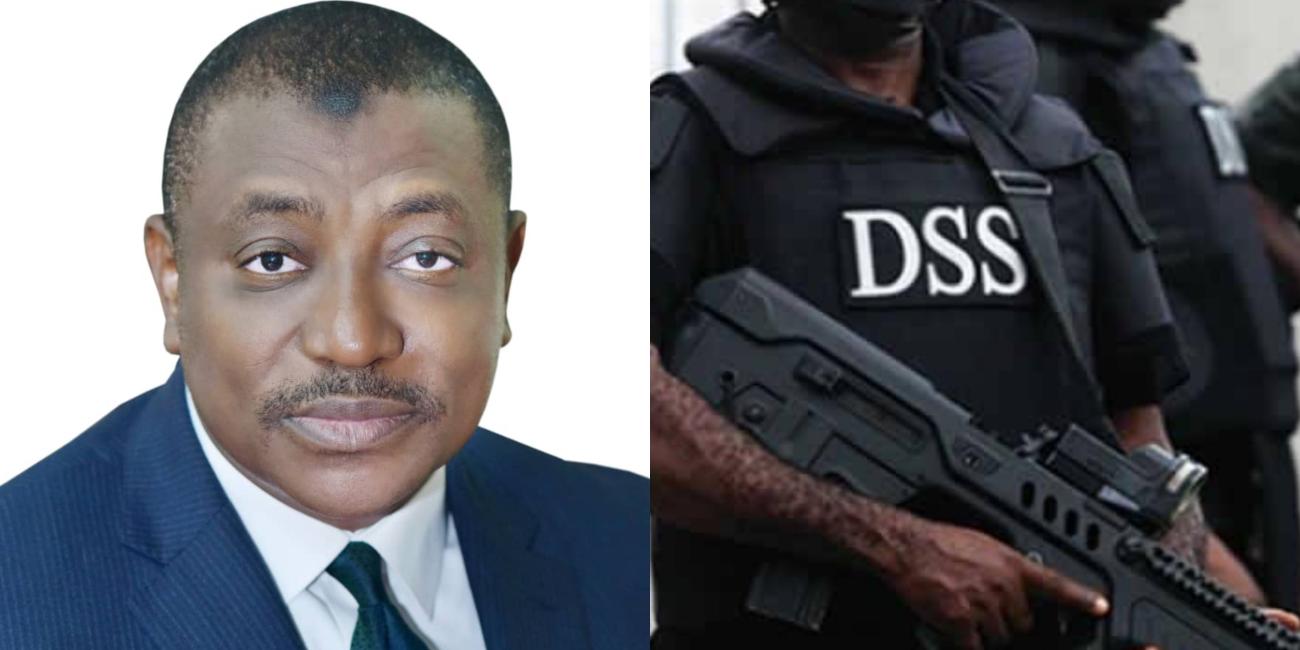DSS Arrests NIRSAL Boss, Masanawa Over Alleged Conspiracy With Emefiele To Loot Printing, Minting Company
Posted by Samuel on Sat 19th Aug, 2023 - tori.ng
Abbas Umar Masanawa, the Chief Executive Officer of Nigeria Incentive-Based Risk Sharing System for Agricultural Lending (NIRSAL), has been arrested by the Department of State Services (DSS).
He was arrested for allegedly conspiring with the suspended Governor of the Central Bank of Nigeria (CBN), Godwin Emefiele, to loot printing and minting corporation.
Peoples Gazette reports that sources in the secret police said that Masanawa was taken into custody three weeks ago and had remained in the DSS custody while their investigation continued.
It was however not immediately clear whether or not the NIRSAL boss had hired lawyers to represent him in the case.
Masanawa’s arrest reportedly stemmed from his role as the managing director of Nigerian Security Printing and Minting Company (NSPMC).
Masanawa resigned from NSPMC after it was reported that he wanted to run for governorship election as a member of the ruling All Progressives Congress (APC) while still in office as the printing and minting boss.
The NSPMC which is a subsidiary of the CBN is responsible for printing and minting Nigeria's currency notes, coins and high-level security documents.
A source privy to Masanawa’s arrest was quoted by Peoples Gazette as saying, “He was conspiring with Godwin Emefiele to loot the printing and minting agency,” adding, “We are still tracing billions they stole.”
However, it was not immediately clear why President Bola Tinubu approved Masanawa’s detention without first suspending him from office, especially since his detention for the past three weeks has crippled NIRSAL’s ability to operate.
Meanwhile, the DSS spokesperson Peter Afunaya reportedly said “No comment,” when asked about Masanawa’s arrest.
Masanawa's arrest came after Tinubu appointed an anti-graft expert, Jim Obazee, to uncover fraud at the CBN and other federal agencies.
The Obazee-led team is said to have initiated a probe into all relevant agencies that are said to have connived with the CBN and its sprawling parastatals.
In May 2022, SaharaReporters reported that as NSPMC boss, Masanawa had picked up the N50 million APC governorship nomination and expression of interest forms ahead of the primaries for the 2023 elections.
In addition to printing banknotes and postal orders of Nigeria, NSPMC also prints some electoral materials for the Independent National Electoral Commission.
The company, also referred to as The MINT, was established in 1963 by the Nigerian government in partnership with De La Rue of the UK and is under the Central Bank of Nigeria.
It began full operation in 1965, producing currency notes and coins for the CBN as well as a wide range of security documents for the government, commercial banks, and blue-chip companies, among others.
Earlier in 2022, the Auditor General for the Federation in its 2019 report indicted the mint company under Masanawa for N162 billion in financial infractions.
According to the AuGF, the management of the Nigerian government-owned company could not account for the said amount.
The report said N91.1 billion, which appeared in the consolidated financial statements of the minting company for the year ended 31st December 2018 could not be verified and reconciled with the Assets Register due to the non-existence of a proper Non-Current Asset Inventories Ledger.
It also said that Inventories of Raw Materials amounting to N4,459,141,000.00 and Consumables amounting to N2,364,112,000.00 could also not be verified due to the non-existence of proper Inventory Receipts & Issues ledger.
The report said, “In all, a total of N97,918,703,000.00 reported in the company’s financial statement could not be confirmed. The above anomalies could be attributed to weaknesses in the internal control system at the Nigerian Security Printing and Minting Plc.”
The AuGF report also said the sum of N48,931,124,278.37 was overcharged against the Statement of Financial Performance of the company for the years 2016 and 2019 with no verifiable evidence to justify these expenses as most of the figures contained in the Statement of Financial Performance were different from the balances obtained from the Trial Balance.
The report said that the minting company spent about N14.43 billion on salaries and allowances for its staff between 2016 and 2019 without the approval of the National Salaries, Income and Wages.
It also said that in contravention of the Pension Reform Acts, the company paid salaries to its workers without fully deducting only 5% from the workers as against the minimum 8% as stipulated in the law.
The report added that the company failed to deduct about N432.812 million contributory pension from its workers within the period.













































